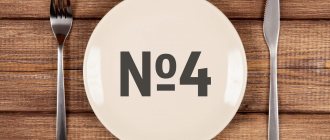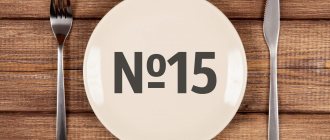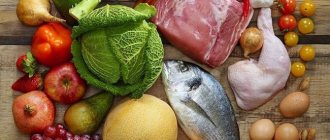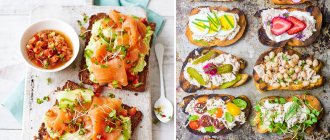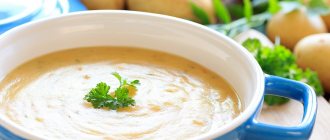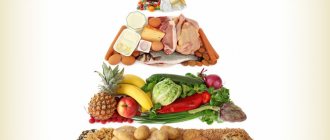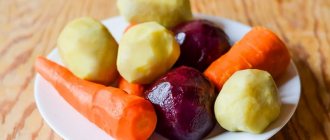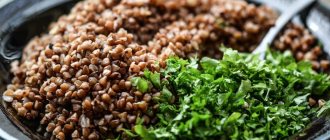General characteristics of dietary table No. 1B
Diet No. 1B fully satisfies a person’s physiological needs for energy and nutrients in a hospital setting. Diet No. 1B provides less severe protection of the stomach from mechanical, chemical and temperature irritation than diet 1A. All dishes are liquid and mushy. Excluded are dishes and products that have a strong effect on the walls and mucous membranes, stimulate secretion, are difficult to digest, hot and cold dishes. Diet No. 1B provides for fractional meals at least 6 times a day, in small portions. Milk is recommended before bed. The main difference between diet 1B and diet 1A is the gradual increase in calorie intake and the proportion of nutrients.
The essence of the diet
Diet No. 1b is aimed at protecting the mucous membrane of the stomach and duodenum from mechanical, thermal and chemical aggression, as well as reducing the inflammatory process, accelerating the healing process of ulcerative lesions, and providing the entire body with the necessary elements during semi-rest or bed rest.
For diseases of the heart and blood vessels, we recommend that you familiarize yourself with diet number 10.
Chemical composition and energy value of dietary table No. 1B
Proteins: 90 g (at least 50% animal proteins). Fats: 80 g (at least 30% vegetable fats). Carbohydrates: 300–350 g (no more than 30 g of simple carbohydrates). Daily calorie content: 2,200 – 2,500 kcal. Free liquid: 1.5–2 l. Table salt: up to 6–8 g. Vitamins: retinol (A) 2 mg, riboflavin (B2) 4 mg, thiamine (B1) 4 mg, nicotinic acid (B3) 30 mg, ascorbic acid (C) 100 mg. Macroelements: calcium 0.8 g, magnesium 0.5 g, phosphorus 1.2 g. Microelements: iron 15 mg. Optimal food temperature: from 20 to 60 degrees Celsius.
Dish recipes
Table No. 1b can be quite varied and tasty. Using the list of allowed products, you can prepare interesting dishes. We bring to your attention several delicious and simple recipes.
Vegetable rice soup
Boil and puree the zucchini and carrots, pour the broth obtained during cooking over the vegetables, add a little rice flour and a mixture of beaten egg and milk. Boil the soup for 7-10 minutes, add 1 tablespoon of butter and a pinch of salt.
Steam cutlets
Beat 300 grams of lean beef with a blender or mince twice through a meat grinder, soak a slice of white bread in 2 tablespoons of milk and beat an egg. Combine everything, knead the minced meat and form cutlets, which then cook in a double boiler for 20-25 minutes.
Steamed cottage cheese soufflé
Mix 280-300 grams of cottage cheese, 75 ml of milk, two tablespoons of semolina, the yolk of one egg and a little sugar in a blender. Separately, beat two egg whites until foam forms and gently fold it into the curd mass. Place the dough in a greased pan and steam for about 20 minutes.
Recommended products and dishes of dietary table No. 1B
Bread: wheat crackers up to 100 g per day. Soups: slimy water soups with semolina, oatmeal, rice cereals with the addition of cream, butter or egg-milk mixture. Puréed soups made from rice, barley, pearl barley, milk or with pureed vegetables (carrots, potatoes, cauliflower). Meat dishes: boiled or steamed purees, soufflés, quenelles, steam cutlets (pass the minced meat through a meat grinder 2 times) from beef, veal, chicken, turkey, rabbit. Fish dishes: steam soufflés, quenelles, cutlets from low-fat fish. Side dishes: liquid pureed porridge from rice, buckwheat; liquid porridge from rice, buckwheat, oatmeal, perhaps adding pureed vegetables (carrots, potatoes, cauliflower). Porridge: liquid mashed porridge from rice, buckwheat, liquid porridge from rice, buckwheat, oatmeal with the addition of milk, cream, butter. Dairy products: milk, cream, steam soufflé made from non-acidic fresh pureed cottage cheese. Eggs: soft-boiled or steamed omelet (no more than 3 eggs per day). Sweet dishes: jelly, jelly made from milk or fruits and berries, honey, sugar. Drinks: weak tea with milk, rosehip infusion, bran infusion, sweet juices diluted with water in a ratio of 1: 1. Fats: unsalted fresh butter, refined vegetable oil.
When is diet table 1a and 1b prescribed?
Diet Table 1a is indicated during bed rest in the first days of a sharp exacerbation of a stomach or duodenal ulcer. The regime completely limits the patient from consuming products that cause chemical, mechanical and thermal irritation to the affected organs in order to speed up the healing of ulcers. The principle of operation of therapeutic Table No. 1a according to Pevzner: the calorie content of the daily menu is reduced from normal 2800 Kcal to 1800-2000 Kcal by reducing the amount of carbohydrates consumed - to 200 g . The amount of protein and fat in the patient's diet is also reduced - to 90 g in both cases. Important: salt consumption for gastritis, gastric and duodenal ulcers should be reduced as much as possible , or even completely excluded from the menu.
How I lost half my weight in six months
Table 1b is recommended during the attenuation of an attack of peptic ulcer, or with gastritis after diet No. 1a according to Pevzner. Therapeutic diet 1b also limits the entry of irritants into the stomach and intestines, helping to restore normal functioning of the affected organs. The energy value of the daily menu for the Table 1b diet provides for 2400-2600 Kcal, cutting only the amount of carbohydrates consumed - to 350 g . The amount of incoming proteins and fats should not be less than 90-95 g per day.
Diet 1a and 1b for gastric ulcer
For gastric or duodenal ulcers, therapeutic diet No. 1a requires adherence to a strict diet for up to two weeks. Attacks of acute and chronic gastritis with diet Table 1a must be treated from two days to a week. For these diseases, food should be served warm, in the form of porridge or puree. For gastritis, gastric and duodenal ulcers, doctors advise dividing meals into small portions six times a day.
popular:
- ✅ Strange but effective weight loss methods used by celebrities
- ✅ Effective Biocomplex formula helps get rid of food addiction
- ✅ Minus 24 kg without leaving home! A Muscovite who lost weight in quarantine “blew up” Russia with her recipe
You should switch to the Table 1b diet after attacks of stomach and duodenal ulcers have subsided , as well as during gastritis, and adhere to the treatment menu until the doctor allows you to switch to a normal diet. Food still needs to be boiled in water or steam, or baked.
Permitted and prohibited products
Table 1a and 1b are a type of strict therapeutic diets in which the patient is advised to adhere to the list of products when creating a menu. That is why permitted and prohibited foods for diets 1a and 1b are strictly marked.
Recommended products for diet 1a and 1b:
An innovative drug for losing weight by 30-40 kg! Removes even age-related fat without chemicals, liposuction, diets or exercise. Exercises
- First, for gastritis, stomach and duodenal ulcers, make rich mucous soups with oatmeal, rice, and pearl barley;
- Among the cereals that are suitable for patients, semolina, buckwheat and rice;
- Beets, potatoes and carrots can only be consumed in puree form;
- The list of allowed meat products for diets 1a and 1b includes lean types of meat, such as chicken, turkey, rabbit, beef or veal, boiled and twice ground through a meat grinder;
- It is allowed to consume milk, butter, cream, steamed soufflé-like cottage cheese;
- Eggs can be prepared as a steamed or soft-boiled omelet;
- The treatment menu of diets 1a and 1b includes sweet berries and fruits, but you can eat them in the form of jelly and jelly;
- The patient can drink weak tea, rosehip infusion, wheat bran decoction, and juices diluted with water.
Excluded foods for diet 1a and 1b:
- Both during the active phase of gastritis and ulcers of the stomach and duodenum, and during a lull, all bakery and pasta products are excluded from the patient’s menu;
- First courses cannot be prepared from rich broths of meat, mushrooms and fish;
- Fresh vegetables are completely excluded from the diet in diets 1a and 1b;
- It is also impossible to prepare dishes from fatty and stringy meats;
- All types of cheeses, fresh cottage cheese and sour cream should also be excluded from the menu;
- All raw and sour fruits are prohibited;
- Patients will have to forget about carbonated drinks, coffee, kvass and cocoa for a while.
Important: recommendations regarding the use of kefir in diets 1a and 1b differ. Medical Table 1a prohibits kefir for patients with stomach and intestinal ulcers, while Table 1b, on the contrary, recommends kefir for remission of peptic ulcers and gastritis.
Diet 1a - menu for the week
To soften the treatment regimen for lesions of the stomach and duodenum, you can adhere to this sample menu for a week with diet Table No. 1a.
Monday
How to avoid obesity and regain an erection at any age?
- semolina porridge, rosehip decoction;
- baked apple;
- soup with small vegetables;
- fruit jelly;
- steamed chicken cutlet, water rice.
Tuesday
- steamed omelette, tea;
- a glass of rosehip infusion;
- slimy decoction of pearl barley with pieces of carrots;
- dried fruit jelly;
- boiled beef, mashed potatoes.
Wednesday
- oatmeal, weak green tea;
- milk jelly;
- cream soup of potatoes, carrots and chicken;
- baked apple;
- rabbit meat soufflé, baked zucchini.
Thursday
- two soft-boiled eggs, apple-carrot puree, green tea;
- fruit jelly;
- decoction of vegetable broth with steamed quenelles;
- baked apple;
- Buckwheat porridge, steamed balls.
Friday
- rice porridge with milk with a piece of butter, herbal tea;
- steamed omelette;
- creamy potato and zucchini soup;
- apple jelly, rosehip decoction;
- steamed rabbit with baked eggplants.
Saturday
- semolina milk soup with pumpkin;
- rice pudding with sour jam;
- beetroot;
- strawberry jelly;
- grated cottage cheese baked with seasonal fruits.
Sunday
- baked omelette with minced meat, rosehip decoction;
- pear jelly;
- rice milk soup with sweet jam;
- milk mousse with gelatin and berries;
- steamed fish soufflé, buckwheat porridge.
Before going to bed with diet 1a, it is useful to drink a glass of rosehip decoction or warmed milk; this will have a beneficial effect on the healing processes of ulcers and will soothe attacks of pain due to gastritis.
“Space diet” by Sergei Sivokho: without denying himself anything, the comedian lost 42 kg in 3 months
Diet 1b - menu for the week
Sample menu for a week for the treatment of gastritis, gastric and duodenal ulcers with a therapeutic diet Table No. 1b.
Monday
- semolina porridge with butter and berry jam, black tea;
- cottage cheese pudding with peaches;
- puree soup with potatoes and turkey meat;
- baked apple;
- broccoli and carrot puree, steamed chicken quenelles.
Tuesday
- soft-boiled eggs, applesauce, a glass of milk;
- rice pudding with fruit soufflé;
- vegetable soup with meatballs;
- pumpkin puree with honey;
- stewed zucchini, veal cutlets baked in weak tomato juice.
Wednesday
- oatmeal, herbal tea;
- grated apples with carrots and honey;
- fish soup on lean fish and potatoes;
- fruit jelly;
- rice cutlets with minced rabbit, mashed potatoes.
Thursday
- steam omelette with rice;
- milk jelly with berries;
- a decoction of weak broth and half with chicken broth;
- a glass of warm milk;
- pureed turkey fillet with vegetables in a slow cooker.
Friday
- semolina porridge, sweet fruit jam, black tea;
- pear jelly;
- barley soup with carrots;
- dried fruit jelly;
- homemade veal pate, rice porridge.
Saturday
- milk buckwheat porridge with butter and honey, tea;
- steamed cottage cheese soufflé with fruit;
- beetroot soup with small vegetables;
- rosehip decoction;
- mashed potatoes, fish cutlets.
Sunday
- rice milk porridge with honey, herbal infusion;
- applesauce;
- soup with low-fat chicken broth;
- strawberry jelly;
- steamed rabbit, buckwheat porridge with grated carrots.
Before going to bed on diet 1b, doctors recommend that patients drink a glass of kefir or fermented baked milk; this addition to the menu will help the body quickly cope with ailments of the stomach or duodenum.
Excluded foods and dishes of dietary table No. 1B
Foods that require active activity of the gastrointestinal tract, cause pain, stimulate secretion, and irritate the walls of the gastrointestinal tract should be excluded from the diet. Excluded are bread and bakery products, vegetables (except potatoes, carrots, cauliflower), snacks, pasta, coffee, cocoa, pickles, smoked foods, canned food, marinades, seasonings, sauces, carbonated drinks (including kvass). Also exclude strong tea, concentrated juices, compotes, meat and fish broths, fried and stewed dishes, mushrooms, butter dough, fermented milk products, sharp cheeses, coarse cereals (millet, corn, barley and pearl barley), sorrel, onions, cucumbers, tomatoes, legumes, white cabbage, spinach, turnips, radishes, radishes, sour fruits and berries.
What can you do on a diet?
With diet No. 1b according to Pevzner, you are allowed to include the following foods in your diet:
- Flour products: wheat bread made from premium flour (dried or yesterday), cookies and buns - uneaten, dry sponge cake, wheat crackers;
- Meat products: meat without tendons (lean), skin and fascia, lean lean ham, liver pate, boiled tongue and liver, dietary sausages, curd meats;
- Fish products: low-fat varieties of fish or seafood without skin;
- Dairy products: yoghurt, milk, kefir, cream, low-fat fermented milk products, low-fat mild cheese, various curd dishes;
- Soups: non-rich vegetable puree soups, cereal soups, milk soups, pureed noodle soups;
- Porridges: buckwheat, oatmeal, rice porridge, cooked in water or milk, steam soufflés from ground cereals, vermicelli (all porridges must be pureed);
- Vegetables: any vegetables are allowed, but only in the form of purees, light cream soups;
- Fruits: ripe sweet fruits (peaches, bananas, plums), berries (strawberries and raspberries);
- Up to three eggs per day – soft-boiled or as a steamed omelet;
- Sweets: jelly, honey, marshmallows, jam, pastille;
- Milk, sour cream sauce.
What foods can and cannot be eaten on a cholesterol-lowering diet? - read in this article.
Recommended drinks include rosehip decoction, black and green tea with milk, compotes and juices with water.
Sample menu for dietary table No. 1B
First breakfast: soft-boiled egg, pureed rice porridge with milk, tea with milk. Second breakfast: baked apple with sugar, milk. Lunch: pureed pearl barley soup with carrots, steamed fish dumplings, rosehip broth. Afternoon snack: bran decoction, wheat crackers. Dinner: steamed chicken cutlets, cottage cheese soufflé, juice with water. At night: milk.
Sources:
- Order of the Ministry of Health of the Russian Federation No. 330 “On measures to improve clinical nutrition in medical institutions of the Russian Federation” dated 05.08.2003
Indications for use
Therapeutic nutrition of dietary table 1b is prescribed for the following pathological conditions:
- Gastric or duodenal ulcer at the stage of special exacerbation;
- Gastroduodenitis;
- Burns of the esophagus;
- Acute gastritis;
- Chronic gastritis during the subsiding period.
Also, diet No. 1b according to Pevzner is recommended during the recovery period after gastric surgery, for various infectious diseases of the gastrointestinal tract (in the absence of diarrhea) and for a hiatal hernia. As an alternative, you can use the 5p diet, which is also intended for people with a history of stomach diseases.
Dietary table recipes No. 1B:
- liquid pureed oatmeal with water
- steamed 2 egg white omelette
- Tea with lemon
- rosehip decoction
- slimy soup with semolina
- steam souffle of boiled meat
- compote decoction
- meat puree
- milk cream
- steamed boiled fish soufflé
- liquid pureed buckwheat porridge on water
- fruit jelly
- curd soufflé
- egg-milk mixture
- steamed chicken cutlets
Photos used in this material belong to shutterstock.com
Menu - table
If treatment is carried out in a hospital setting, then the preparation of food is the responsibility of the hospital staff, which greatly simplifies life. At home, you can eat according to a menu compiled independently, taking into account nutritional value and nutritional principles. The tentative menu for the week of table 1b can be seen in the table.
| Day of the week | Eating | Menu |
| Monday | Breakfast | Omelette (steamed) and green tea with milk |
| Lunch | Milk | |
| Dinner | Oatmeal with milk (liquid consistency), steamed meat soufflé, berry or fruit jelly | |
| Afternoon snack | Rosehip infusion | |
| Dinner | Mashed potatoes, steamed chicken cutlets, berry or fruit jelly | |
| Tuesday | Breakfast | Buckwheat porridge with milk (mashed through a blender), two soft-boiled eggs, semi-sweet tea with milk |
| Lunch | Applesauce (you can add sugar) | |
| Dinner | Rice soup with milk (put through a blender), steamed chicken cutlets, mashed potatoes, dried fruit compote | |
| Afternoon snack | Rose hip decoction | |
| Dinner | Fish with milk sauce, baked in the oven, boiled carrots, green tea | |
| Wednesday | Breakfast | Steamed cottage cheese soufflé, unsweetened green tea |
| Lunch | Fruit or berry jelly | |
| Dinner | Semolina porridge with water (liquid), juice diluted with water | |
| Afternoon snack | Rose hip decoction | |
| Dinner | Steamed meat souffle, tea with milk (you can add honey) | |
| Thursday | Breakfast | Buckwheat porridge with milk (liquid consistency), 112 grams of non-acidic cottage cheese and coffee with milk |
| Lunch | Dry cookies and sweet fruit jelly | |
| Dinner | Oatmeal soup with meatballs, steamed fish balls, high-grade flour bread (or crispbread), fruit jelly | |
| Afternoon snack | Rosehip decoction and 1 cookie | |
| Dinner | Boiled chicken breast, squash and potato puree, dried fruit compote | |
| Friday | Breakfast | Semolina porridge with milk (not thick) and green tea |
| Lunch | Fruit or berry jelly | |
| Dinner | Boiled buckwheat porridge, steamed beef cutlets, oatmeal soup and fruit compote | |
| Afternoon snack | Rosehip decoction and biscuit | |
| Dinner | Pumpkin and zucchini puree, fish quenelles and green tea | |
| Saturday | Breakfast | Steamed curd soufflé and tea with milk |
| Lunch | Peach juice with biscuit | |
| Dinner | Rice porridge with zucchini puree, steamed chicken cutlets, berry or fruit compote | |
| Afternoon snack | Curd cheesecake with berry jelly | |
| Dinner | Ground rice porridge, steamed fish soufflé, green tea | |
| Sunday | Breakfast | Steamed omelette, tea (you can add cream) |
| Lunch | Rose hip decoction and fruit jelly | |
| Dinner | Potato soup with dill, boiled beef, berry jelly | |
| Afternoon snack | Dried fruit compote and a few crackers | |
| Dinner | Pike perch baked in milk sauce, buckwheat porridge, green tea |
When creating a menu, it is necessary to take into account that the food should not only be healthy, but also varied. With diet 1b, you can ask your doctor for a weekly menu with recipes.
Reviews
In case of exacerbation of a peptic ulcer, switching to therapeutic nutrition according to diet table No. 1b allows you to relieve inflammation in about 6 days, eliminate pain, belching, heartburn, and also reduce the likelihood of relapse. In addition, such nutrition allows you to lose weight, as many people with a similar problem have already discovered. Without physical activity, you can get rid of extra pounds, which subsequently do not return. The amazing results of people who have tried this diet can be seen in the photo.
Reviews about diet No. 1b are mostly positive; the only drawback of such nutrition is the need to constantly prepare new dishes, which can be difficult for a working person.
Share the article on social media. networks:
( 1 ratings, average: 5.00 out of 5)
